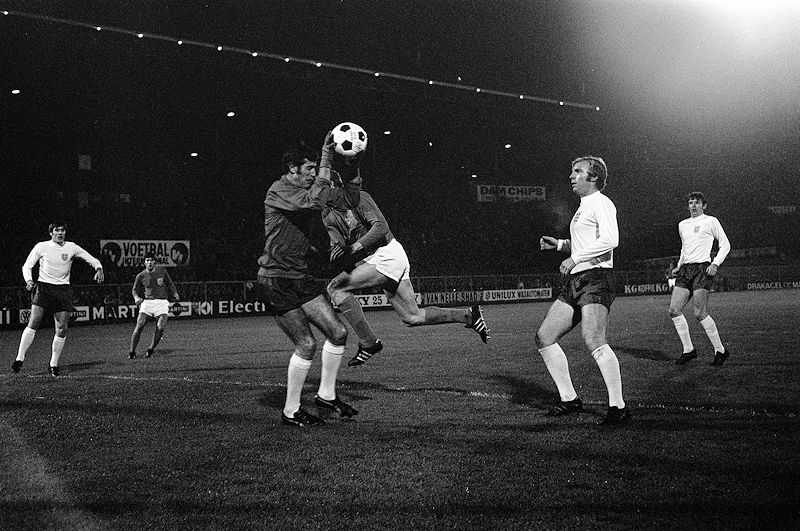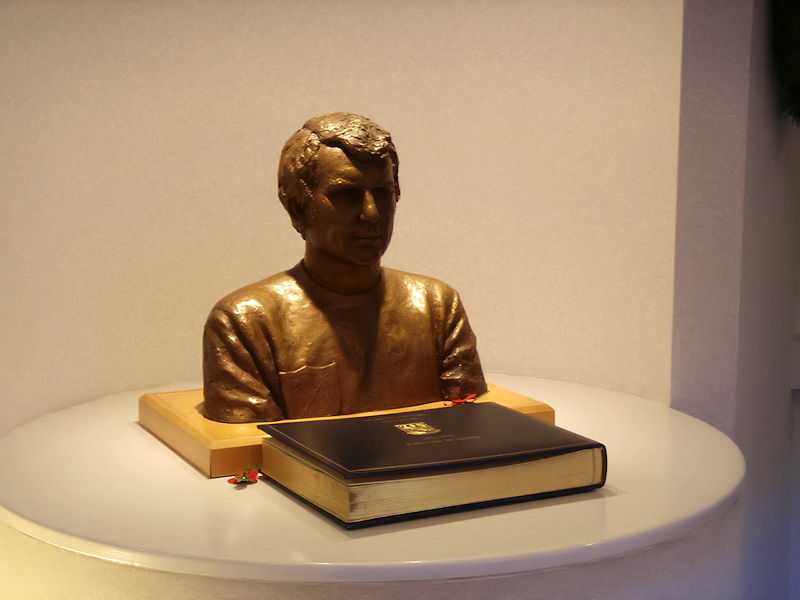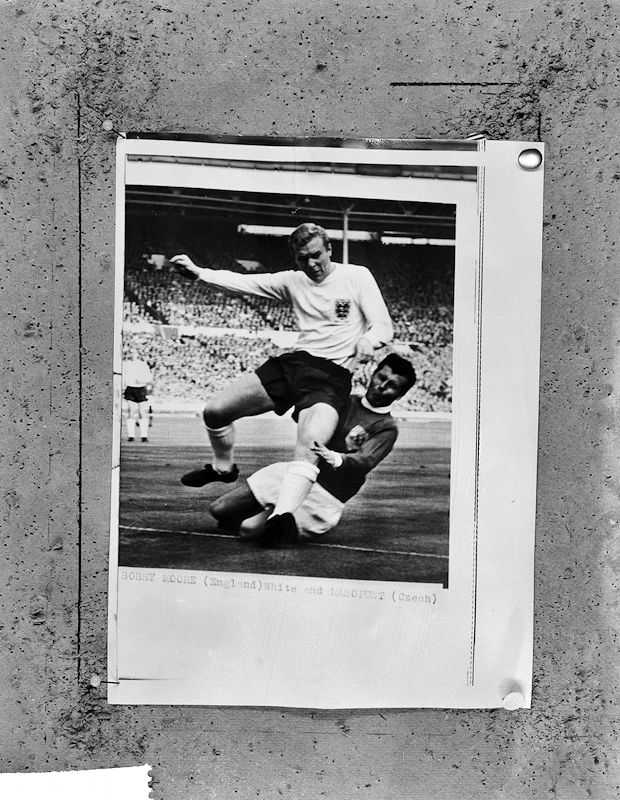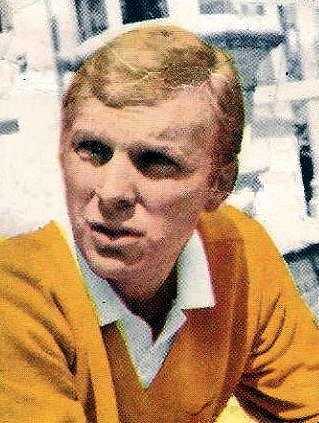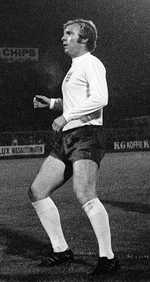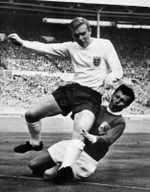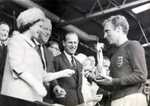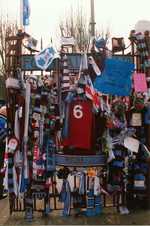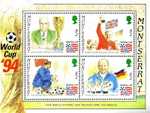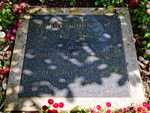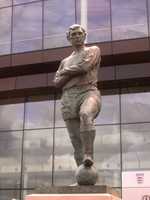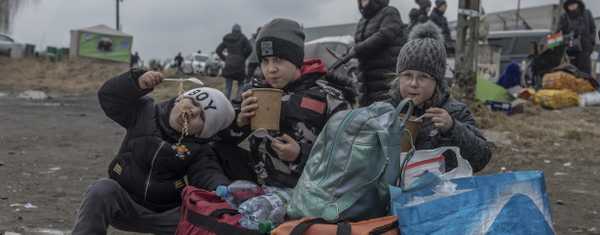1. Moore's early life
Bobby Moore was born in April 1941 in Barking in the East End of London.
The house he grew up in is now adorned with an English Heritage blue plaque, the first footballer to be commemorated in this way. Moore loved his football growing up and played the game while at Barking Primary School and at Tom Hood school in Leytonstone, as well as for the Leyton district youth sides.
However, he had other sporting talents as well, playing cricket for an Essex school’s team. Also in this cricket side was Geoff Hurst, scorer of the world cup final hat-trick in 1966. English football fans will be forever relieved both Moore and Hurst ultimately chose the football route for their careers.
Approaching school leaving age Moore was considering a career as a draughtsman when he was asked to attend coaching lessons at West Ham. He did not make a huge impression initially but he had an ethos to work hard on his game and to improve.
In 1956 he joined the club as part of the ground staff, where he carried on receiving coaching and playing matches as part of the youth set-up. Senior players were heavily involved in coaching the younger players at the ‘academy’ and Moore was taken under the wing of Malcolm Allison.
In 1958 Bobby Moore signed his first professional contract for West Ham. Another influence on the young Moore was Ron Greenwood who was looking after the England Youth set up. Greenwood would later become manager at West Ham in 1961.
2. His early career
The year Moore signed for West Ham was the club’s first in the top flight, the old first division.
He made his debut for the first team on 8th September 1958, putting in an assured performance wearing the number 6 shirt in a 3-2 win against Manchester United. One man’s good fortune was another man’s bad luck as the player who made way for Moore was his mentor Malcolm Allison, who had been working hard to recover from tuberculosis. Allison never played for West Ham in the top league, but graciously acknowledged the right decision had been made.
West Ham established themselves over the next few years in division 1 and Moore was soon captaining the England youth side. He was called up to the England senior side for the first time in 1962, making his debut in a 4-0 win against Peru, the final warm up match before the 1962 World Cup finals.
Moore had done enough to earn a place in the squad and he played in every game until England’s departure at the Quarter final stages. In 1963 he captained his country for the first time in only his 12th appearance and was given the captaincy permanently during friendlies played in 1964 when England had failed to advance to the latter stages of the European Championships.
Back home Moore helped West Ham to win the FA Cup in 1964 when they beat Preston North End 3-2 in the final. He would be awarded the Football Writer’s Association Footballer of the Year for that year. Wembley was going to prove to be a popular place for Moore as he returned there the following year with West Ham in the 1965 European Cup Winners Cup final, beating 1860 Munich 2-0. West Ham lost the two-leg League cup final in 1966 to West Brom, but this disappointment was about to be more than made up for.
3. The World Cup of 1966
Just prior to England’s greatest footballing triumph Moore was in dispute with West Ham and would not sign a new contract.
Under the rules of the time this meant he was technically ineligible to play for his country. Fortunately the dispute was resolved and the England Captain was able to take his place for the opening game against Uruguay, a disappointing goalless draw.
Back on track
England won the next match 2-0 versus Mexico to get them back on track, progressing out of the group and on to the final. Moore was ever present through the tournament, a calm and inspiring figure at the back.
The Final
In the final against West Germany Moore delivered the free kick from which Geoff Hurst headed the equaliser, bringing England back in to a game they went on to win 4-2 after extra-time. Ever the sporting gentleman Moore cleaned off his muddy hands before shaking the Queen’s hand and accepting the World Cup trophy from her. Bobby Moore had achieved every young footballer’s dream.
Moore won the BBC Sports Personality of the Year award in 1966, the first footballer to do so.
England's success in the 1966 World Cup was of wider significance in a decade in which the nation seemed to find its feet post-World War Two.
The 1970 World Cup
He would retain the England captaincy for the 1970 World Cup in Mexico, though controversy was to strike first. Days before the tournament was due to begin Moore was falsely accused of stealing an emerald bracelet while in Bogota, Colombia.
He was placed under a form of house arrest and conditionally released just three days before the World Cup, though he was later cleared of the charge. It was far from the ideal preparations, but performances such as the one against Brazil and his laser-like precision tackle on Jarzhinio during that game showed Moore at his best. However, England could not repeat the feats of 1966, losing to West Germany in the quarter-finals 3-2 after extra-time.
Moore's late career
Moore continued playing for England until 1973, retiring with a then record 108 caps. He had overtaken teammate Bobby Charlton's record of 106 caps earlier that year. The record is now held by goal keeper Peter Shilton, who won 125 caps, with Moore sixth on the list.
Back home Moore continued to play for West Ham until 1974 when he left to join Fulham, where he remained until 1977. In one of those twists of fate the game often throws up Fulham reached the FA Cup final in 1975, with the opponents at Wembley Stadium Moore’s former club of so many years, West Ham. Fulham lost 2-0 and following his spell there, Moore crossed the Atlantic and played for a couple of teams in the US.
4. Retirement and Legacy
When his playing career ended Bobby Moore tried his hand at managing, firstly at Oxford City alongside Harry Redknapp, and then Southend.
Neither was a success and he left the game to become a sports editor in 1986, a position he held until 1990 when he moved in to radio commentary. Yet he remained a popular and well respected figure and was one of a number of footballers who appeared in the film Escape to Victory.
Moore was awarded the OBE in 1967, just one of many accolades he would receive, including induction in to the football hall of fame in 2002. In 2007 his services to English football were recognised when a statue of Moore was unveiled outside the new Wembley Stadium, while the following year West Ham retired the number 6 shirt in honour of their former Captain, 50 years after his debut for the club.
Bobby Moore died in February 1993 of bowel cancer, aged 51. He had been married twice, meeting his first wife Tina in 1957 and marrying his second wife Stephanie in 1991. He had two children from his first marriage. Following his death Stephanie worked with Cancer Research to set up the Bobby Moore Fund, raising money and public awareness to help with life-saving research in to bowel cancer. To date over £27 million has been raised by the fund.
Bobby Moore will always be remembered as the Captain of England’s first and so far only World Cup winning team. Of his 108 international appearances 90 of them were as Captain. Indeed England’s World Cup winning manager Alf Ramsey called Moore “the spirit and heartbeat of the team” without whom they would not have been victorious.
Although he had his contractual issues with West Ham he spent over 15 years at the club, a time span almost unheard of in the modern game. One of the finest players ever, Pele, referred to Bobby Moore as the greatest defender he ever played against, and one of the most iconic pictures from the 1970 World Cup shows the respect and admiration between two opponents as they swapped shirts following the Brazil versus England game.
